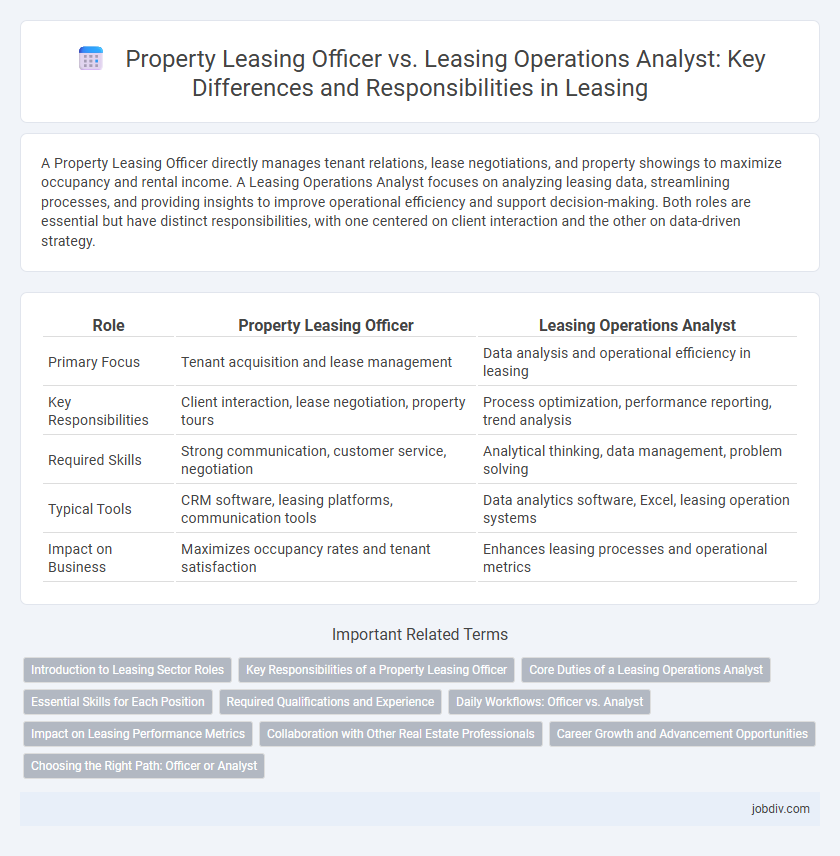A Property Leasing Officer directly manages tenant relations, lease negotiations, and property showings to maximize occupancy and rental income. A Leasing Operations Analyst focuses on analyzing leasing data, streamlining processes, and providing insights to improve operational efficiency and support decision-making. Both roles are essential but have distinct responsibilities, with one centered on client interaction and the other on data-driven strategy.
Table of Comparison
| Role | Property Leasing Officer | Leasing Operations Analyst |
|---|---|---|
| Primary Focus | Tenant acquisition and lease management | Data analysis and operational efficiency in leasing |
| Key Responsibilities | Client interaction, lease negotiation, property tours | Process optimization, performance reporting, trend analysis |
| Required Skills | Strong communication, customer service, negotiation | Analytical thinking, data management, problem solving |
| Typical Tools | CRM software, leasing platforms, communication tools | Data analytics software, Excel, leasing operation systems |
| Impact on Business | Maximizes occupancy rates and tenant satisfaction | Enhances leasing processes and operational metrics |
Introduction to Leasing Sector Roles
Property Leasing Officers manage tenant relationships, coordinate property viewings, and negotiate lease agreements to maximize occupancy rates and rental income. Leasing Operations Analysts focus on analyzing leasing data, optimizing operational workflows, and supporting strategic decision-making to improve overall leasing performance. Both roles are essential for efficient property management and revenue growth within the leasing sector.
Key Responsibilities of a Property Leasing Officer
A Property Leasing Officer is primarily responsible for managing tenant relations, conducting property tours, and negotiating lease agreements to maximize occupancy and rental income. They handle tenant screening, prepare leasing documentation, and ensure compliance with property regulations and policies. This role demands strong customer service skills and a thorough understanding of real estate market trends to effectively match potential tenants with available properties.
Core Duties of a Leasing Operations Analyst
A Leasing Operations Analyst specializes in analyzing lease data, streamlining leasing processes, and ensuring compliance with regulatory standards. They develop key performance indicators (KPIs) to optimize leasing efficiency and collaborate with property management to resolve operational discrepancies. Their core duties include data management, reporting lease portfolio performance, and supporting leasing strategy through advanced analytics.
Essential Skills for Each Position
Property Leasing Officers excel in customer relationship management, negotiation, and in-depth knowledge of leasing regulations to effectively secure tenants and manage property leases. Leasing Operations Analysts specialize in data analysis, reporting, and process optimization to enhance operational efficiency and support strategic decision-making within leasing departments. Mastery of communication skills is crucial for Leasing Officers, while proficiency in data analytics tools and financial acumen is essential for Leasing Operations Analysts.
Required Qualifications and Experience
A Property Leasing Officer typically requires a background in real estate, property management, or business administration, with strong interpersonal skills and experience in tenant relations, lease negotiations, and property marketing. In contrast, a Leasing Operations Analyst demands proficiency in data analysis, financial modeling, and operational processes within leasing, often requiring experience with leasing software and advanced Excel skills. Both roles commonly require a bachelor's degree, but the Property Leasing Officer leans more toward hands-on leasing and client interaction experience, whereas the Analyst focuses on analytical and operational expertise.
Daily Workflows: Officer vs. Analyst
Property Leasing Officers manage tenant relations, conduct property showings, and handle lease agreements to ensure occupancy and tenant satisfaction. Leasing Operations Analysts focus on data analysis, tracking leasing metrics, and optimizing operational workflows to enhance efficiency and support strategic decision-making. Both roles collaborate to balance tenant experience with process improvements, yet the officer emphasizes direct client interaction while the analyst prioritizes data-driven insights.
Impact on Leasing Performance Metrics
A Property Leasing Officer directly influences leasing performance metrics by managing tenant relations, conducting property showings, and closing lease agreements, thereby driving occupancy rates and rental revenue. In contrast, a Leasing Operations Analyst impacts these metrics through data analysis, process optimization, and reporting, enabling strategic decision-making that enhances lease cycle efficiency and tenant retention. Together, their roles synergize to improve overall leasing performance by combining hands-on tenant engagement with data-driven operational insights.
Collaboration with Other Real Estate Professionals
Property Leasing Officers collaborate closely with real estate agents, property managers, and maintenance teams to ensure tenant satisfaction and streamline leasing processes. Leasing Operations Analysts work alongside data analysts, financial planners, and compliance officers to optimize lease administration and enhance operational efficiency. Both roles require effective communication and coordination to align leasing activities with broader property management goals.
Career Growth and Advancement Opportunities
Property Leasing Officers typically gain hands-on experience managing tenant relations and lease agreements, which builds essential skills for supervisory roles in property management. Leasing Operations Analysts focus on data-driven decision-making and process optimization, positioning themselves for advancement into strategic planning or portfolio management. Both career paths offer growth opportunities, with officers often moving into property management leadership and analysts advancing into business analytics or operations director roles.
Choosing the Right Path: Officer or Analyst
A Property Leasing Officer primarily manages tenant relationships, lease agreements, and property inspections, focusing on direct interaction and compliance with leasing policies. In contrast, a Leasing Operations Analyst emphasizes data analysis, market research, and process optimization to improve leasing strategies and operational efficiency. Choosing between these roles depends on whether you prefer hands-on property management or analytical, data-driven decision-making within the leasing industry.
Property Leasing Officer vs Leasing Operations Analyst Infographic

 jobdiv.com
jobdiv.com